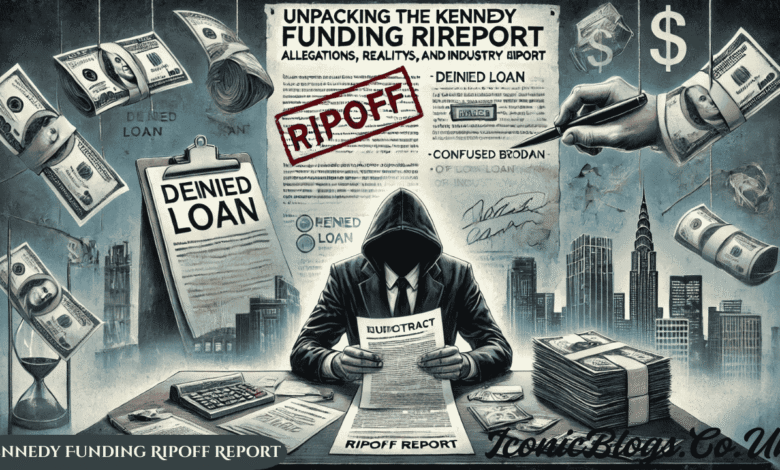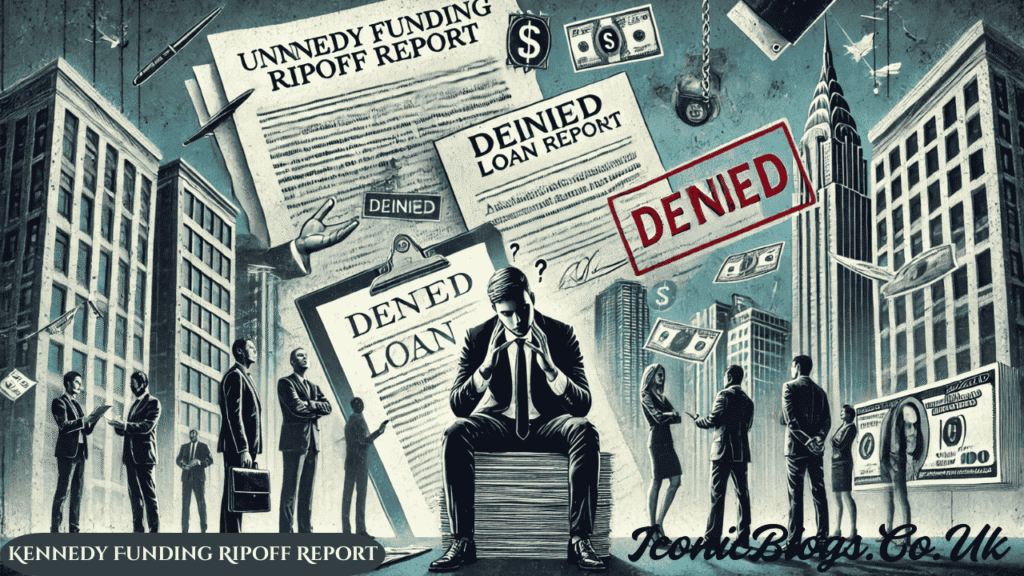Unpacking the Kennedy Funding Ripoff Report: Allegations, Realities, and Industry Impact

Understanding the Kennedy Funding Ripoff Report
In the realm of private commercial lending, Kennedy Funding has long stood as a known entity. Specializing in high-risk, asset-based loans, especially in situations where conventional lenders hesitate, Kennedy Funding has carved a niche for itself in the financial sector. However, with rising popularity also comes scrutiny, and the term “Kennedy Funding ripoff report” has sparked debates among borrowers, industry insiders, and watchdogs alike.
This article aims to unpack the complexities of the Kennedy Funding ripoff report, investigate the core allegations, examine documented complaints and reviews, and ultimately offer readers a comprehensive understanding of the company’s standing in the alternative lending industry.
1. Kennedy Funding: Background and Lending Practices
Kennedy Funding is a direct private lender offering bridge loans secured by commercial real estate. Based in New Jersey, the company promotes itself as a fast solution for borrowers in need of urgent funding, especially those who cannot qualify for traditional bank loans due to credit issues, time constraints, or property-related complexities.
Their typical loan offering includes international loans, land loans, development loans, and acquisition loans with high interest rates and short repayment terms. The company boasts of an expedited approval process and fast closings, often appealing to investors looking for quick capital injection.
But such rapid-fire financing doesn’t come without its critics. The Kennedy Funding ripoff report theme has often been fueled by concerns over a lack of transparency, alleged hidden fees, and aggressive loan terms that leave borrowers in precarious positions.
2. The Origins of the Kennedy Funding Ripoff Report
The term “Kennedy Funding ripoff report” largely originates from various online consumer complaint forums where borrowers have shared their dissatisfaction. Ripoff reports, complaint board entries, and independent blog posts detail experiences of borrowers who felt blindsided by the terms, delays in funding, or unexpected costs.
These complaints generally cluster around a few central themes:
- Non-refundable due diligence fees that yield no tangible results.
- Loans that fall through at the last minute, despite initial approval.
- Escrow delays and opaque closing processes.
- High-pressure sales tactics or misleading promises during initial conversations.
While it is not uncommon for financial institutions, especially in the high-risk lending space, to receive backlash, the frequency and intensity of these reports have led some to question Kennedy Funding’s ethics and accountability.
3. Borrower Complaints: Analyzing Real Experiences
A closer look at borrower testimonies in the Kennedy Funding ripoff report narratives reveals a pattern of dissatisfaction:
a. Non-Refundable Fees: Many borrowers express anger at having paid large upfront due diligence or application fees, often in the range of tens of thousands of dollars, only for the loan to never materialize. Some allege that Kennedy Funding uses these fees as a revenue stream rather than a legitimate cost of underwriting.
b. Delayed or Canceled Closings: Another recurring theme is delayed closings. Borrowers claim they were told the loan would close within a certain time frame—say, 10 to 15 days—but the process dragged on for months. In some cases, loans were ultimately denied, leaving borrowers not only out of pocket but also scrambling for alternative financing.
c. Miscommunication and Poor Transparency: Several borrowers report vague communication once fees are paid. Promises made at the beginning of the application process are allegedly not upheld, and customer service becomes evasive, leading to frustration and suspicion.
These grievances form the backbone of the Kennedy Funding ripoff report discussions across numerous forums and review platforms.
4. Company Responses and Legal Safeguards
It is important to note that Kennedy Funding, like many lenders, includes disclaimers in its contracts and communication materials. These often state that fees are non-refundable, and funding is not guaranteed even after initial approval.
Kennedy Funding has, in some cases, responded to Ripoff Report allegations by asserting that applicants failed to meet underwriting requirements or provided incomplete documentation. The company maintains that due diligence is a legitimate, cost-intensive process and that fees cover necessary evaluations.
Moreover, the private lending industry operates in a legal grey zone where lender protection is emphasized in contracts. Borrowers who enter into agreements without fully understanding the terms may find it difficult to pursue legal recourse later.
5. Industry Context: Is Kennedy Funding an Outlier?
In high-risk lending, Kennedy Funding is not unique in its practices. Many private lenders operate similarly, charging upfront fees to assess applications and offering no guarantees of funding.
However, what seems to distinguish Kennedy Funding in the Ripoff Report discussions is the volume and consistency of complaints. Some industry analysts argue that the firm’s aggressive marketing tactics and ambiguous terms contribute to borrower confusion and dissatisfaction.
Compared to other private lenders, Kennedy Funding has a higher visibility due to its international presence and large loan sizes. This increased exposure may naturally result in more publicized complaints, though it also demands greater accountability.
6. Evaluating the Kennedy Funding Ripoff Report Claims
While the Kennedy Funding ripoff report includes many troubling borrower accounts, it’s vital to approach these reports critically. Not every complaint reflects malpractice; some result from misunderstandings, unrealistic borrower expectations, or the complex nature of commercial lending.

However, the pattern of complaints cannot be ignored. Potential red flags include:
- Consistent reports of non-refundable fees without service delivery.
- Lack of communication post-payment.
- Deals falling through at the final stage.
To properly evaluate these claims, borrowers are encouraged to request references from past clients, read all documents carefully, and consult legal counsel before signing any agreement.
7. Tips for Avoiding Private Lending Scams
If you’re considering a private loan with Kennedy Funding or a similar firm, here are some best practices:
a. Verify Credentials: Check for licensing, Better Business Bureau ratings, and past litigation history.
b. Get Everything in Writing: Ensure all promises, terms, and timelines are clearly documented.
c. Understand Fees: Request a detailed breakdown of all fees and ask what happens if the loan doesn’t close.
d. Consult a Lawyer: Have a qualified attorney review the contract and advise on risks.
e. Compare Offers: Seek quotes from multiple lenders to assess fair market terms.
Being proactive can make the difference between a successful funding experience and falling victim to predatory lending practices.
8. Final Thoughts: The Real Impact of the Kennedy Funding Ripoff Report
The Kennedy Funding ripoff report is more than just a collection of disgruntled voices—it’s a reflection of the tension between desperate borrowers and opportunistic lenders in a high-stakes financial environment.
While not all allegations may hold up under legal scrutiny, the volume and consistency suggest that prospective borrowers should tread carefully. Kennedy Funding, like many in its industry, occupies a complex role: offering capital where others won’t, but at a cost that can sometimes border on exploitative.
In conclusion, anyone researching Kennedy Funding or encountering the term “Kennedy Funding ripoff report” should take a balanced approach. Investigate thoroughly, ask questions, protect yourself legally, and remember that due diligence is your first and best defense.
What topics does the Kennedy Funding ripoff report discuss the most frequently?
- Non-refundable due diligence fees
- Delayed or canceled loan closings
- Vague or evasive customer service
- Unclear terms and conditions
- Borrower dissatisfaction with transparency
- Legal disclaimers in fine print
- Misalignment of expectations between the lender and the borrower
Also Read: All About myfast broker.com: Complete Guide
